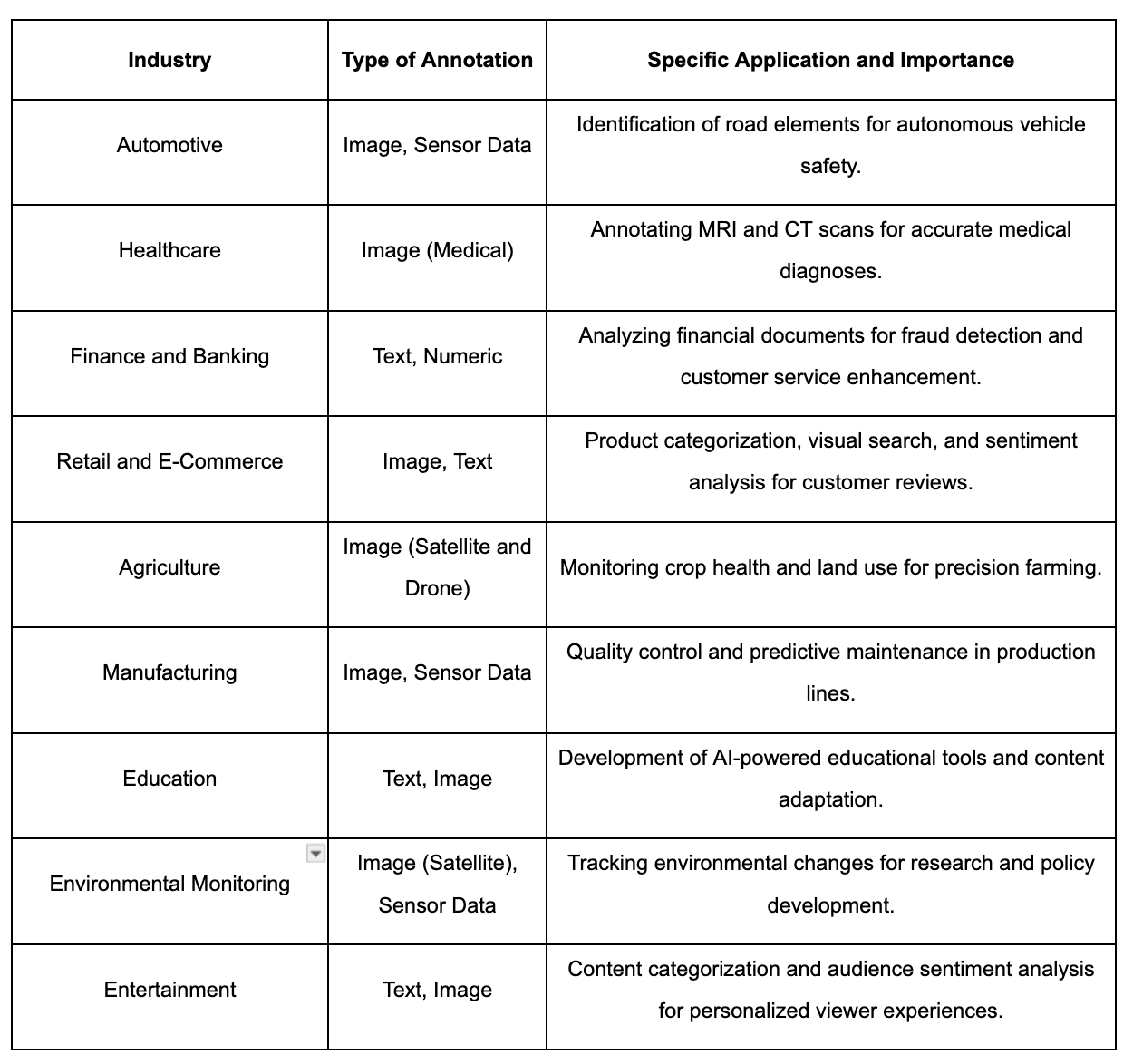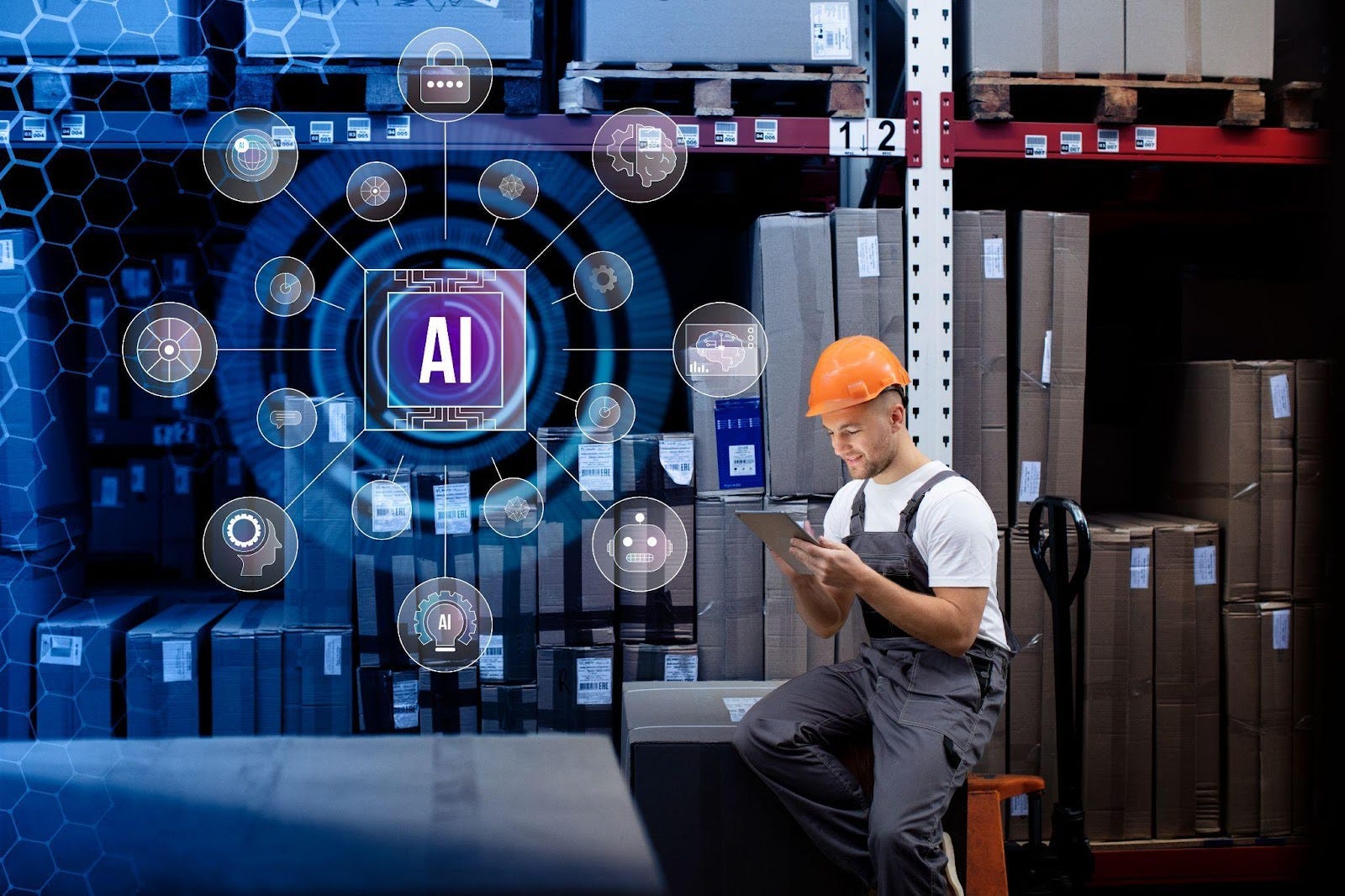The realm of Artificial Intelligence (AI) is constantly evolving, with data annotation at its heart. This task, vital for training AI models, varies significantly across industries. Each sector, from healthcare to finance, faces unique challenges in data annotation. Generic methods fall short in meeting these diverse needs. This highlights the importance of industry-specific solutions in data annotation.
Such tailored approaches are not just beneficial --- they're crucial for the advancement of AI applications in different sectors. By focusing on specialized data annotation, AI systems become more than accurate; they're relevant and effective within their specific industry contexts. It's about creating AI tools that are perfectly suited for their intended tasks, embodying the principle of 'the right tool for the right job.'
Image Source: freepik.com
Understanding Data Annotation in AI
In the evolving landscape of Artificial Intelligence (AI), one of the foundational processes that enable AI systems to function effectively is data annotation. This process is at the heart of training AI models, allowing them to interpret and respond to the world around them. It involves the careful labeling or tagging of various forms of data, such as text, images, or videos. Central to this process is the expertise of a data annotation specialist, whose role is to ensure that the data is accurately prepared for AI models. While the task might appear straightforward, it is a critical step in the machine learning process, as the quality and precision of annotations have a direct impact on the performance of AI applications.
Data annotation in AI is similar to the process of teaching a child to recognize and categorize different objects. Just as a child learns from being shown various examples, AI models develop their understanding from meticulously categorized data, a task handled by experienced professionals in data labeling. This process is essential for enabling AI systems to process extensive amounts of data and to make informed decisions based on that information.
Acting as a crucial link, data annotation connects raw data to functional AI solutions. It involves transforming unstructured data into a format that is interpretable by machines, a task expertly executed by professionals skilled in data processing. Without their detailed and comprehensive work in data annotation, an AI model's ability to learn and perform accurately would be significantly impaired. Therefore, the precision and attention to detail provided by these specialists are paramount, highlighting their indispensable role in enhancing the functionality of AI systems in machine learning.
Different Types of Data Annotation
Data annotation comes in various forms, each serving a specific purpose in the realm of AI and machine learning. Understanding these types is essential for adapting AI solutions to different applications.
- Image Annotation: This process involves labeling or tagging images with relevant keywords or bounding boxes, a crucial step in enabling AI models to recognize and interpret visual data accurately. Beyond basic identification, image annotation is instrumental in training AI to understand context and nuances within visual information. From powering facial recognition systems in security applications to identifying defects in manufacturing processes, image annotation plays a pivotal role in numerous AI-driven technologies.
- Text Annotation: In the field of natural language processing (NLP), text annotation emerges as a critical component. This process involves tagging text data with labels, a task that requires a nuanced understanding of language, context, and sentiment. Given the complexity and importance of this process, many organizations look to hire text annotation experts who possess specialized skills in linguistics and contextual analysis. These experts play a vital role in helping AI systems like chatbots, virtual assistants, and other tools interpret and respond to human language with a high degree of accuracy and understanding.
- Audio Annotation: In this type, sound recordings are transcribed and annotated to help AI systems understand and respond to auditory data, a critical step in developing sophisticated audio-interactive technologies. This process involves not only transcribing speech but also identifying and interpreting various sound patterns, tones, and nuances. Audio annotation is integral in developing voice-activated systems like smart speakers, automated customer service lines, and advanced language translation services. It plays a key role in enhancing the capabilities of AI in voice recognition and natural language understanding, allowing for more natural and intuitive user interactions.
- Video Annotation: Video annotation extends beyond static images to encompass motion and time, adding a dynamic dimension to data interpretation. By labeling and categorizing elements within video data, AI models can learn to interpret actions, events, and behaviors, which is crucial for a range of advanced applications. This process is essential in areas like surveillance, where it aids in recognizing and analyzing patterns of movement or identifying potential security threats. In the development of autonomous vehicles, video annotation is vital for teaching AI systems to navigate complex real-world environments, understand traffic scenarios, and respond appropriately..
Each annotation type serves a distinct purpose in AI development. While image and video annotations are more visual-centric, focusing on recognizing and interpreting visual cues, text and audio annotations deal with language and sound, enabling AI to understand and interact with human communication. The diversity in data annotation types ensures that AI can be adapted to a wide range of applications, from simple voice commands to complex image recognition tasks.
The Significance of Tailored Solutions in Diverse Industries
Customized data annotation is vital across various industries, each with its unique challenges and requirements. Exploring how specific sectors benefit from these tailored annotation services reveals the diverse applications and importance of customized data annotation.
- Healthcare Sector: Precision is paramount in healthcare data annotation. Here, the focus is often on annotating complex medical imagery, such as MRI and CT scans, to assist in accurate diagnoses. These annotations help in identifying subtle nuances in medical images, crucial for detecting conditions like tumors or fractures. The accuracy of these annotations directly influences patient treatment plans and outcomes.
- Finance and Banking: The finance sector leverages text and numeric data annotation to enhance services like fraud detection, risk assessment, and customer service. By annotating financial documents and transaction data, AI systems can learn to recognize patterns indicative of fraudulent activity or to understand customer queries in automated chatbots. The challenge lies in interpreting complex financial jargon and transactional data accurately.
- Automotive Industry: In the world of self-driving cars and advanced driver-assistance systems, annotation services for automotive play a very important role. Services here focus on the precise identification of road elements like lane markings, traffic signals, and pedestrians. This level of detailed annotation is crucial for ensuring the safety and efficiency of autonomous vehicles, where even minor errors can have significant consequences
- Retail and E-Commerce: In this sector, data annotation is utilized for enhancing customer experience and optimizing supply chain management. Image annotation helps in product categorization and visual search capabilities, while text annotation aids in sentiment analysis of customer reviews and feedback. Accurate annotations here can lead to better product recommendations and more effective customer engagement strategies.
- Agriculture: Data annotation in agriculture involves annotating satellite and drone imagery to monitor crop health, pest infestation, and land use. This type of annotation helps in precision farming techniques, enabling farmers to make informed decisions about irrigation, harvesting, and crop rotation.
- Manufacturing: In manufacturing, data annotation is used for quality control and machinery maintenance. Image annotation helps in identifying defects in products or components, while sensor data annotation assists in predictive maintenance of equipment. This results in improved product quality and reduced downtime in manufacturing processes.
- Education: Text and image annotation in education facilitates the development of AI-powered educational tools and content. This includes annotating educational materials for better content delivery and personalizing learning experiences based on student interactions and performance.
- Environmental Monitoring: Data annotation in environmental monitoring involves labeling satellite imagery and sensor data to track changes in ecosystems, weather patterns, and pollution levels. This assists in climate research and helps formulate environmental policies and conservation strategies.
- Entertainment: In the entertainment industry, annotation is used for content categorization, recommendation systems, and audience sentiment analysis. By understanding viewer preferences and trends, content can be tailored to enhance user engagement and satisfaction.
Each industry demands a distinct approach to data annotation, considering the nature of the data and the specific outcomes required. Automotive needs precision for safety, healthcare requires accuracy for patient care, and finance seeks clarity in complexity. The expertise of a data annotation expert, knowledgeable in a specific industry's nuances, is essential for achieving the desired accuracy and effectiveness in AI applications.
Annotation Types and Industry Applications Recap
Building on the discussion of industry-specific data annotation needs, it's crucial to examine how different types of annotations are applied uniquely in each sector. The following comparative table encapsulates a succinct overview, highlighting both the types of annotations used and their specific applications in various industries. This recapitulation not only emphasizes the diverse nature of data annotation but also underlines the tailored approach necessary for each industry's unique requirements. An understanding of this symbiotic relationship between the type of data annotation and its pivotal role in industry-specific applications can be gained through this table.

The implications of these findings are clear. Each industry not only harnesses different types of data annotation but also molds these tools to serve their unique operational goals and challenges. The nuances captured in this table are a testament to the evolving landscape of AI and its usage across diverse industries sectors.
Choosing the Right Data Annotation Partner
In the dynamic landscape of AI development, the role of data annotation is indispensable. As businesses venture into the realm of AI, choosing the right partner for data annotation becomes a strategic decision. This choice is not only about technical competence but also about aligning with a partner that understands the specificities and intricacies of your industry and AI applications. Selecting an ideal data annotation partner is crucial for businesses aiming to harness the power of AI. The choice often boils down to finding proficient data labelling and annotation services that can adapt to the unique demands of your AI projects. Here are practical tips to guide this decision, ensuring the chosen partner boosts the efficiency and accuracy of AI applications:
- Evaluate Accuracy and Quality: Investigate the partner's track record. Request case studies or examples of previous work to assess their ability to deliver precise and high-quality annotations. It's beneficial to conduct a trial project to gauge their quality of work firsthand.
- Assess Scalability Potential: Determine the partner's ability to scale operations. Ask about their workforce size and flexibility, technology infrastructure, and how they have managed scale-up scenarios in the past. This ensures they can adapt to your growing needs.
- Verify Industry-Specific Experience: Look for a partner with proven expertise in your sector. Their understanding of industry-specific nuances can be a game-changer. Inquire about their previous projects in your industry and the results achieved.
- Explore Technology and Tools Used: Check what annotation tools and technologies they use. Partners who leverage cutting-edge annotation platforms can offer more efficient and accurate results. Ask if they employ AI-assisted annotation techniques, which can enhance quality and speed.
- Prioritize Data Security: Ensure the partner has stringent data security and confidentiality measures. Inquire about their data handling protocols, compliance certifications, and security audits. This is crucial to protect sensitive data.
- Seek References and Testimonials: Contact their current or past clients for feedback. Client testimonials can provide insights into their reliability, communication, and project management skills.
Selecting the right data annotation partner is integral to harnessing the power of AI in your business. With these practical tips, you can find a partner that aligns with your business objectives and AI strategy, ensuring successful AI implementation.
The Future of Industry-Specific Data Annotation
As we look towards the future, industry-specific data annotation is set to significantly influence AI technology evolution. Here are key trends and innovations expected to shape this field:
- Integration of Advanced AI: Future data annotation will likely see more integration with advanced AI and machine learning algorithms, further automating the annotation process. This will enhance efficiency and reduce the time needed for data preparation.
- Increased Focus on Customization: As AI applications expand into more specialized fields, the demand for highly customized data annotation that caters to specific industry needs will grow. This will lead to more nuanced and sophisticated annotation services.
- Greater Emphasis on Quality and Accuracy: With the growing complexity of AI applications, the quality and accuracy of data annotations will become even more critical. We can expect a heightened focus on developing annotation methodologies that minimize errors and enhance data reliability.
- Expansion in Emerging Industries: New industries will start leveraging AI, necessitating tailored data annotation services. Fields like renewable energy, advanced robotics, and space exploration could see increased AI integration.
- Ethical and Responsible Annotation Practices: As awareness of AI ethics grows, there will be a greater emphasis on responsible and bias-free data annotation practices, ensuring AI systems are fair and equitable.
These trends highlight the dynamic and evolving nature of data annotation, underlining its continued relevance in advancing AI technologies across various sectors.
Conclusion
In conclusion, industry-specific data annotation is not just a component of AI development; it's a critical catalyst for innovation and efficiency across diverse sectors. From automotive to healthcare, finance to education, the customized adaptation of data annotation to meet the unique demands of each industry ensures that AI technologies are not only advanced but also relevant and practical. As we look forward to the future, the significance of specialized data annotation in enhancing the growth and effectiveness of AI applications cannot be overstated. Businesses and technologists should consider how a customized approach to data annotation can significantly elevate their AI initiatives, leading to more accurate, efficient, and impactful outcomes.
Comments
Loading comments…


